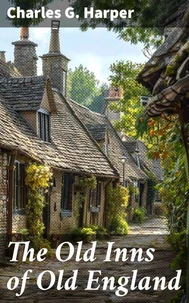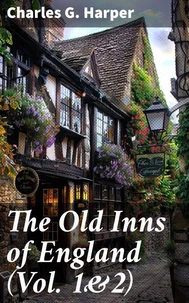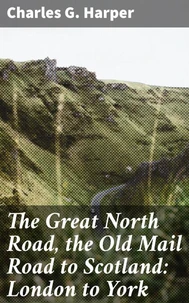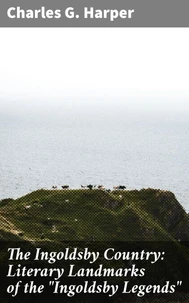Wessex
Par :Formats :
Disponible dans votre compte client Decitre ou Furet du Nord dès validation de votre commande. Le format ePub est :
- Compatible avec une lecture sur My Vivlio (smartphone, tablette, ordinateur)
- Compatible avec une lecture sur liseuses Vivlio
- Pour les liseuses autres que Vivlio, vous devez utiliser le logiciel Adobe Digital Edition. Non compatible avec la lecture sur les liseuses Kindle, Remarkable et Sony
 , qui est-ce ?
, qui est-ce ?Notre partenaire de plateforme de lecture numérique où vous retrouverez l'ensemble de vos ebooks gratuitement
Pour en savoir plus sur nos ebooks, consultez notre aide en ligne ici
- Nombre de pages37
- FormatePub
- ISBN859-65--4721591-2
- EAN8596547215912
- Date de parution04/09/2022
- Protection num.Digital Watermarking
- Taille2 Mo
- Infos supplémentairesepub
- ÉditeurDIGICAT
Résumé
In "Wessex, " Charles G. Harper presents an evocative exploration of the picturesque English countryside, intertwining rich descriptions with a keen sense of local history and culture. The book is rendered in a lyrical style that captures the spirit of rural life in the fictional region crafted by Thomas Hardy. Harper's narrative blends both anecdotal and observational writing, creating a vivid tapestry of the landscapes, flora, and fauna, alongside the nuanced lives of its inhabitants.
This work stands out within the context of late Victorian literature, showcasing a deep appreciation for nature while subtly critiquing the encroachment of industrialization on pastoral life. Charles G. Harper, a prominent travel writer and illustrator of the late 19th century, was deeply influenced by his love for England's scenic beauty and traditional ways of life. His experiences traversing the countryside, alongside his artistic background, provided him with a unique lens through which to document and celebrate the charm of Wessex.
Harper's engagement with Hardy's themes and settings reflects his commitment to preserving the essence of English rural life during a period of rapid change. "Wessex" is a compelling read for anyone interested in the intersection of nature, literature, and history. Harper's engaging prose invites readers to experience the enchanting landscapes of Wessex, prompting reflection on the ongoing dialogue between humanity and the environment.
This book is a must-have for those who appreciate intricately crafted literature that cherishes the pastoral legacy.
This work stands out within the context of late Victorian literature, showcasing a deep appreciation for nature while subtly critiquing the encroachment of industrialization on pastoral life. Charles G. Harper, a prominent travel writer and illustrator of the late 19th century, was deeply influenced by his love for England's scenic beauty and traditional ways of life. His experiences traversing the countryside, alongside his artistic background, provided him with a unique lens through which to document and celebrate the charm of Wessex.
Harper's engagement with Hardy's themes and settings reflects his commitment to preserving the essence of English rural life during a period of rapid change. "Wessex" is a compelling read for anyone interested in the intersection of nature, literature, and history. Harper's engaging prose invites readers to experience the enchanting landscapes of Wessex, prompting reflection on the ongoing dialogue between humanity and the environment.
This book is a must-have for those who appreciate intricately crafted literature that cherishes the pastoral legacy.
In "Wessex, " Charles G. Harper presents an evocative exploration of the picturesque English countryside, intertwining rich descriptions with a keen sense of local history and culture. The book is rendered in a lyrical style that captures the spirit of rural life in the fictional region crafted by Thomas Hardy. Harper's narrative blends both anecdotal and observational writing, creating a vivid tapestry of the landscapes, flora, and fauna, alongside the nuanced lives of its inhabitants.
This work stands out within the context of late Victorian literature, showcasing a deep appreciation for nature while subtly critiquing the encroachment of industrialization on pastoral life. Charles G. Harper, a prominent travel writer and illustrator of the late 19th century, was deeply influenced by his love for England's scenic beauty and traditional ways of life. His experiences traversing the countryside, alongside his artistic background, provided him with a unique lens through which to document and celebrate the charm of Wessex.
Harper's engagement with Hardy's themes and settings reflects his commitment to preserving the essence of English rural life during a period of rapid change. "Wessex" is a compelling read for anyone interested in the intersection of nature, literature, and history. Harper's engaging prose invites readers to experience the enchanting landscapes of Wessex, prompting reflection on the ongoing dialogue between humanity and the environment.
This book is a must-have for those who appreciate intricately crafted literature that cherishes the pastoral legacy.
This work stands out within the context of late Victorian literature, showcasing a deep appreciation for nature while subtly critiquing the encroachment of industrialization on pastoral life. Charles G. Harper, a prominent travel writer and illustrator of the late 19th century, was deeply influenced by his love for England's scenic beauty and traditional ways of life. His experiences traversing the countryside, alongside his artistic background, provided him with a unique lens through which to document and celebrate the charm of Wessex.
Harper's engagement with Hardy's themes and settings reflects his commitment to preserving the essence of English rural life during a period of rapid change. "Wessex" is a compelling read for anyone interested in the intersection of nature, literature, and history. Harper's engaging prose invites readers to experience the enchanting landscapes of Wessex, prompting reflection on the ongoing dialogue between humanity and the environment.
This book is a must-have for those who appreciate intricately crafted literature that cherishes the pastoral legacy.







